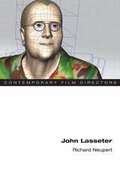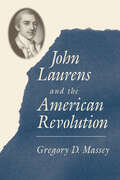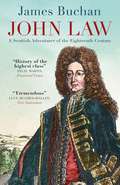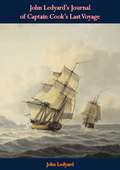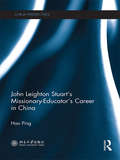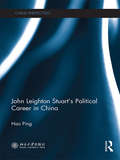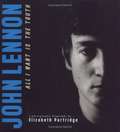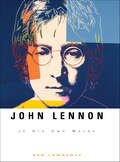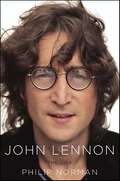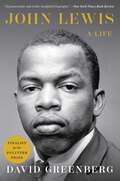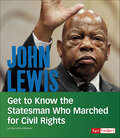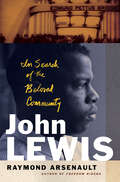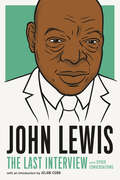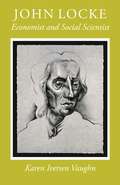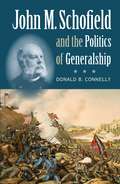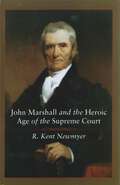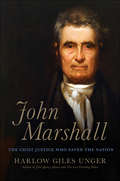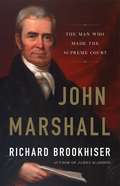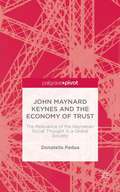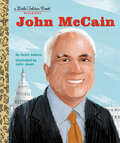- Table View
- List View
John Knox for Armchair Theologians
by Suzanne McdonaldThis volume in the popular Armchair series presents a short and reader-friendly introduction to the tumultuous life and theology of the fiery reformer John Knox. As leader of the Scottish Reformation, Knox notably came into conflict with the Roman Catholic Church, particularly Queen Mary. He was also an outspoken advocate for education and care for the poor, and is widely regarded as the founder of the Church of Scotland. Each chapter includes a description of Knox's activities as well as a discussion of key texts that introduce Knox's theological convictions. Expertly written by Suzanne McDonald, and featuring witty illustrations from Ron Hill, this book offers an intriguing introduction to the life and work of this major theological figure.
John Lasseter (Contemporary Film Directors)
by Richard NeupertCelebrated as Pixar's "Chief Creative Officer," John Lasseter is a revolutionary figure in animation history and one of today's most important filmmakers. Lasseter films from Luxo Jr. to Toy Story and Cars 2 highlighted his gift for creating emotionally engaging characters. At the same time, they helped launch computer animation as a viable commercial medium and serve as blueprints for the genre's still-expanding commercial and artistic development. Richard Neupert explores Lasseter's signature aesthetic and storytelling strategies and details how he became the architect of Pixar's studio style. Neupert contends that Lasseter's accomplishments emerged from a unique blend of technical skill and artistic vision, as well as a passion for working with collaborators. In addition, Neupert traces the director's career arc from the time Lasseter joined Pixar in 1984. As Neupert shows, Lasseter's ability to keep a foot in both animation and CGI allowed him to thrive in an unconventional corporate culture that valued creative interaction between colleagues. The ideas that emerged built an animation studio that updated and refined classical Hollywood storytelling practices--and changed commercial animation forever.
John Laurens and the American Revolution
by Gregory D. MasseyAn &“excellent biography&” of General Washington&’s aide-de-camp, a daring soldier who advocated freeing slaves who served in the Continental Army (Journal of Military History). Winning a reputation for reckless bravery in a succession of major battles and sieges, John Laurens distinguished himself as one of the most zealous, self-sacrificing participants in the American Revolution. A native of South Carolina and son of Henry Laurens, president of the Continental Congress, John devoted his life to securing American independence. In this comprehensive biography, Gregory D. Massey recounts the young Laurens&’s wartime record —a riveting tale in its own right —and finds that even more remarkable than his military escapades were his revolutionary ideas concerning the rights of African Americans. Massey relates Laurens&’s desperation to fight for his country once revolution had begun. A law student in England, he joined the war effort in 1777, leaving behind his English wife and an unborn child he would never see. Massey tells of the young officer&’s devoted service as General George Washington&’s aide-de-camp, interaction with prominent military and political figures, and conspicuous military efforts at Brandywine, Germantown, Monmouth, Newport, Charleston, Savannah, and Yorktown. Massey also recounts Laurens&’s survival of four battle wounds and six months as a prisoner of war, his controversial diplomatic mission to France, and his close friendship with Alexander Hamilton. Laurens&’s death in a minor battle in August 1782 was a tragic loss for the new state and nation. Unlike other prominent southerners, Laurens believed blacks shared a similar nature with whites, and he formulated a plan to free slaves in return for their service in the Continental Army. Massey explores the personal, social, and cultural factors that prompted Laurens to diverge so radically from his peers and to raise vital questions about the role African Americans would play in the new republic. &“Insightful and balanced . . . an intriguing account, not only of the Laurens family in particular but, equally important, of the extraordinarily complex relationships generated by the colonial breach with the Mother Country.&” —North Carolina Historical Review
John Law: A Scottish Adventurer of the Eighteenth Century
by James BuchanAt the summit of his power, John Law was the most famous man in Europe. Born in Scotland in 1671, he was convicted of murder in London and, after his escape from prison, fled Scotland for the mainland when Union with England brought with it a warrant for his arrest. On the continent he lurched from one money-making scheme to the next - selling insurance against losing lottery tickets in Holland, advising the Duke of Savoy - amassing a fortune of some £80,000.But for his next trick he had grander ambitions. When Louis XIV died, leaving a thoroughly bankrupt France to his five-year-old heir, Law gained the ear of the Regent, Philippe D'Orleans. In the years that followed, Law's financial wizardry transformed the fortunes of France, enriching speculators and investors across the continent, and he was made Controller-General of Finances, effectively becoming the French Prime Minister. But the fall from grace that was to follow was every bit as spectacular as his meteoric rise.John Law, by a biographer of Adam Smith and the author of Frozen Desire and Capital of the Mind, dramatises the life of one of the most inventive financiers in history, a man who was born before his time and in whose day the word millionaire came to be coined.
John Law: A Scottish Adventurer of the Eighteenth Century
by James BuchanAt the summit of his power, John Law was the most famous man in Europe. Born in Scotland in 1671, he was convicted of murder in London and, after his escape from prison, fled Scotland for the mainland when Union with England brought with it a warrant for his arrest. On the continent he lurched from one money-making scheme to the next - selling insurance against losing lottery tickets in Holland, advising the Duke of Savoy - amassing a fortune of some £80,000.But for his next trick he had grander ambitions. When Louis XIV died, leaving a thoroughly bankrupt France to his five-year-old heir, Law gained the ear of the Regent, Philippe D'Orleans. In the years that followed, Law's financial wizardry transformed the fortunes of France, enriching speculators and investors across the continent, and he was made Controller-General of Finances, effectively becoming the French Prime Minister. But the fall from grace that was to follow was every bit as spectacular as his meteoric rise.John Law, by a biographer of Adam Smith and the author of Frozen Desire and Capital of the Mind, dramatises the life of one of the most inventive financiers in history, a man who was born before his time and in whose day the word millionaire came to be coined.
John Ledyard’s Journal of Captain Cook’s Last Voyage
by John Ledyard Helen M. Gilkey Robert M. StormTo the Pacific Ocean, and in Quest of a North-West Passage, Between Asia and America; Performed in the Years 1776, 1777, 1778, and 1779Captain John Cook’s last voyage, his third to the Pacific Northwest, was a remarkable one, for his crew included several literate men, scientists, scholars, and specialists. Anticipating a rush into print after the voyage, the British Admiralty ordered all logbooks, journals, diaries, and notes of the crew members confiscated when the fleet returned to England. It has thus been presumed that John Ledyard, the young Yankee sailor, compiled this Journal from memory or from notes which he secretly retained. Aside from its value as an independent account of the Cook voyage, it was the first writing on the Pacific Northwest to be widely distributed in America.
John Leighton Stuart's Missionary-Educator's Career in China (China Perspectives)
by Hao PingIn China, John Leighton Stuart (1876-1962) is a controversial figure occupying an important position in the history of modern China and Sino-U.S. relations. As a scholar and educator, Stuart loved Chinese culture and contributed much to the development of Chinese education. While as a missionary, he was inherently prejudiced against Marxism. As the U.S. ambassador to China, Stuart executed U.S. government's policy, and was finally stereotyped as a symbol of "American imperialism". This book is a comprehensive and systematic study of Stuart's missionary-educator's career in China. It gives a detailed account of Stuart's missionary activities and contribution to the establishment and development of Yenching University as the founding president in China. Yenching, founded in 1919, left a significant and lasting legacy to Chinese education. It also contributed much to western studies on Asian culture with the Harvard-Yenching Institute established in 1928. By collecting substantial relevant materials both at home and abroad, both published and unpublished, this book reveals the multidimensional and complex features of Stuart, getting rid of the stereotype. Academic and general readers interested in Stuart, missionary education in modern China and modern Chinese history will be attracted by this book.
John Leighton Stuart’s Political Career in China (China Perspectives)
by Hao PingIn China, John Leighton Stuart (1876-1962) is a controversial figure occupying an important position in the history of modern China and Sino-U.S. relations. As a scholar and educator, Stuart loved Chinese culture and contributed much to the development of Chinese education. While as a missionary, he was inherently prejudiced against Marxism. As the U.S. ambassador to China, Stuart executed U.S. government's policy, and was finally stereotyped as a symbol of "American imperialism". This book gives a detailed account of Stuart's complicated and deep political involvement in modern China. Stuart had close relationships with Chiang Kai-shek and other high-ranking officials of Kuomingtang (KMT), while he was also an honored guest of Mao Tse-tung and Chinese Communist Party (CCP). During his tenure as the U.S. Ambassador to China, Stuart did implement U.S. government's policy of supporting KMT. But when the CCP's gaining power became inevitable, he took a pragmatic attitude and urged the U.S. government to normalize its diplomatic relations with the Communist Government. These seemingly contradictory behaviors reveal Stuart's complex features and the changeable era. By collecting substantial relevant materials both at home and abroad, both published and unpublished, this book reveals Stuart's multidimensional characters, getting rid of the stereotype. Academic and general readers interested in Stuart, modern Chinese history and Sino-U.S. relations will be attracted by this book.
John Lennon
by Jordi Sierra i FabraA más de veinticinco años del asesinato de John Lennon (Liverpool, 1940 - Nueva York, 1980) a manos de un fanático, Punto de Lectura recupera, actualizada con los datos más recientes, la biografía que escribió Jordi Sierra i Fabra sobre el fundador y el alma del más legendario grupo de rock and roll. A través de sus canciones y de su modo de vida, John Lennon, luchador infatigable por la paz, supo transmitir los sueños -y también las desilusiones- de millones de personas de todo el mundo. Un libro indispensable para conocer a uno de los personajes más carismáticos e influyentes del siglo XX, el autor de inolvidables canciones que siguen vivas en todos nosotros.
John Lennon: A Biography
by Elizabeth PartridgeAward-winning biographer Elizabeth Partridge dives into Lennon's life from the night he was born in 1940 during a World War II air raid on Liverpool, deftly taking us through his turbulent childhood and his rebellious rock 'n' roll teens to his celebrated life writing, recording, and performing music with the Beatles. She sheds light on the years after the Beatles, with Yoko Ono, as he struggled to make sense of his own artistic life - one that had turned from youthful angst to suffocating fame in almost a split second. Partridge chronicles the emotional highs and paralyzing lows that Lennon transformed into brilliant, evocative songs. John Lennon: All I Want Is the Truth is the unforgettable story of one of rock's biggest legends.
John Lennon: In His Own Words
by Ken LawrenceAs writer, actor, and activist, his words and music shaped a generation. John Lennon: In His Own Words is a fitting tribute to a man who changed the world with his music and his message.John Lennon inspired millions during his too-brief lifetime. First with the Beatles, then as a solo artist, philosopher, and peace activist, he spoke for a generation that believed they could change the world, and did. Now his words are preserved in a handsome hardcover volume that will touch his many fans and enlighten a new generation.* "Imagine all the people living life in peace. You may say I'm a dreamer, but I'm not the only one. I hope someday you'll join us, and the world will be as one." * "My role in society, or any artist's or poet's role, is to try and express what we all feel. Not to tell people how to feel. Not as a preacher, not as a leader, but as a reflection of us all."* "You're just left with yourself all the time, whatever you do anyway. You've got to get down to your own God in your own temple. It's all down to you, mate."
John Lennon: The Life
by Philip NormanFor more than a quarter century, biographer Philip Norman's internationally bestselling Shout! has been unchallenged as the definitive biography of the Beatles. Now, at last, Norman turns his formidable talent to the Beatle for whom being a Beatle was never enough. Drawing on previously untapped sources, and with unprecedented access to all the major characters, Norman presents the comprehensive and most revealing portrait of John Lennon ever published.This masterly biography takes a fresh and penetrating look at every aspect of Lennon's much-chronicled life, including the songs that have turned him, posthumously, into a near-secular saint. In three years of research, Norman has turned up an extraordinary amount of new information about even the best-known episodes of Lennon folklore—his upbringing by his strict Aunt Mimi; his allegedly wasted school and student days; the evolution of his peerless creative partnership with Paul McCartney; his Beatle-busting love affair with a Japanese performance artist; his forays into painting and literature; his experiments with Transcendental Meditation, primal scream therapy, and drugs. The book's numerous key informants and interviewees include Sir Paul McCartney, Sir George Martin, Sean Lennon—whose moving reminiscence reveals his father as never seen before—and Yoko Ono, who speaks with sometimes shocking candor about the inner workings of her marriage to John.“[A] haunting, mammoth, terrific piece of work.” -New York Times Honest and unflinching, as John himself would wish, Norman gives us the whole man in all his endless contradictions—tough and cynical, hilariously funny but also naive, vulnerable and insecure—and reveals how the mother who gave him away as a toddler haunted his mind and his music for the rest of his days.
John Lennon: Young Rock Star (Easy Biographies)
by Laurence SantreyA brief biography of the English rock musician with emphasis on his early years and the formation of the famous Beatles.
John Lewis: A Life
by David GreenbergPulitzer Prize Finalist New York Times Book Review Top 100 Books of 2024 Explore the &“comprehensive and compelling&” (Jon Meacham) biography of civil rights leader John Lewis, celebrated as &“the conscience of Congress,&” through a narrative that weaves together exclusive interviews, never-before-seen FBI files, and documents, offering profound insights into his significant role in American history and the civil rights movement.Born into poverty in rural Alabama, John Lewis rose to prominence in the civil rights movement, becoming second only to Martin Luther King, Jr. in his contributions. As a Freedom Rider, he played a crucial role in integrating bus stations across the South. Lewis was a prominent leader in the Nashville sit-in movement and delivered a historic speech at the 1963 March on Washington. As the youngest speaker and chairman of the Student Nonviolent Coordinating Committee (SNCC), he transformed it into a major civil rights organization. His legacy endures through the harrowing events at the Edmund Pettus Bridge in Selma, Alabama, where he survived a brutal beating on &“Bloody Sunday.&” David Greenberg&’s &“authoritative…definitive biography&” (David J. Garrow, Pulitzer Prize–winning author) follows Lewis&’s journey beyond the civil rights era, highlighting his leadership in the Voter Education Project, where he helped enroll millions of African American voters across the South. This book uncovers the little-known story of his ascent in politics, first locally in Atlanta and then as a respected member of Congress. As part of the Democratic leadership, Lewis was admired on both sides of the aisle for his unwavering dedication to nonviolent integration and justice. Rich with new insights, Greenberg&’s work captures John Lewis&’s influential career through documents from numerous archives, interviews with 275 people who knew him, and rare footage of Lewis speaking from his hospital bed after Selma. John Lewis offers unparalleled details about his personal and professional relationships and stands as the definitive biography of a man whose heroism during the civil rights movement paved the way for a new era of freedom in America.
John Lewis: Get to Know the Statesman Who Marched for Civil Rights (People You Should Know)
by Jehan Jones-RadgowskiJohn Lewis knew that treating someone differently because of the color of their skin was unfair and wrong. In his early 20s, he decided to do something about it. During the struggle for equal treatment, Lewis faced many beatings and was arrested around 40 times. But he would become one of the most influential leaders in the civil rights movement. He continues that work today.
John Lewis: In Search of the Beloved Community (Black Lives)
by Raymond ArsenaultThe first full-length biography of civil rights hero and congressman John Lewis For six decades John Robert Lewis (1940–2020) was a towering figure in the U.S. struggle for civil rights. As an activist and progressive congressman, he was renowned for his unshakable integrity, indomitable courage, and determination to get into &“good trouble.&” In this first book-length biography of Lewis, Raymond Arsenault traces Lewis&’s upbringing in rural Alabama, his activism as a Freedom Rider and leader of the Student Nonviolent Coordinating Committee, his championing of voting rights and anti-poverty initiatives, and his decades of service as the &“conscience of Congress.&” Both in the streets and in Congress, Lewis promoted a philosophy of nonviolence to bring about change. He helped the Reverend Martin Luther King Jr. and other civil rights leaders plan the 1963 March on Washington, where he spoke at the Lincoln Memorial. Lewis&’s activism led to repeated arrests and beatings, most notably when he suffered a skull fracture in Selma, Alabama, during the 1965 police attack later known as Bloody Sunday. He was instrumental in the passage of the Voting Rights Act of 1965, and in Congress he advocated for racial and economic justice, immigration reform, LGBTQ rights, and national health care. Arsenault recounts Lewis&’s lifetime of work toward one overarching goal: realizing the &“beloved community,&” an ideal society based in equity and inclusion. Lewis never wavered in this pursuit, and even in death his influence endures, inspiring mobilization and resistance in the fight for social justice.
John Lewis: and Other Conversations (The\last Interview Ser.)
by John Lewis Jelani CobbFeaturing interviews of civil rights activist and congressman John Lewis at almost every stage of his career, this collection illustrates why Lewis has become a human rights icon and remains an inspiration to activists todayThroughout John Lewis&’s long and storied career he maintained a seemingly unwavering hope for a better future. This hope can be traced throughout the inteviews collected here. From a young activist testifying in the aftermath of Bloody Sunday to recounting the violence he met as a Freedom Rider to an elder statesman inspired by today's civil rights activists, this collection forms a portrait of a man whose life was spent fighting for a better world and never lost hope.
John Locke: A Biography
by Maurice CranstonThis is a biography of John Locke who died in 1704. The author has written the biography based on Lovelace Collection as principal source which contained nearly three thousand letters and about a thousand miscellaneous manuscripts. These include accounts, which, because Locke was always careful with money, are unusually detailed; library lists; notebooks containing entries on philosophy, politics, literature, science, theology, economics and colonial administration; several more elaborate manuscripts on the same subjects; recipes, inventories, certificates of various kinds, and ten volumes of Locke's journal.
John Locke: Economist and Social Scientist
by Karen Iversen VaughnIn "John Locke: Economist and Social Scientist" Karen Iversen Vaughn presents a comprehensive treatment of Locke's important position in the development of eighteenth century economic thought.
John M. Schofield and the Politics of Generalship
by Donald B. ConnellyIn the first full biography of Lieutenant General John McAllister Schofield (1831-1906), Donald B. Connelly examines the career of one of the leading commanders in the western theater during the Civil War. In doing so, Connelly illuminates the role of politics in the formulation of military policy, during both war and peace, in the latter half of the nineteenth century.Connelly relates how Schofield, as a department commander during the war, had to cope with contending political factions that sought to shape military and civil policies. Following the war, Schofield occupied every senior position in the army--including secretary of war and commanding general of the army--and became a leading champion of army reform and professionalism. He was the first senior officer to recognize that professionalism would come not from the separation of politics and the military but from the army's accommodation of politics and the often contentious American constitutional system. Seen through the lens of Schofield's extensive military career, the history of American civil-military relations has seldom involved conflict between the military and civil authority, Connelly argues. The central question has never been whether to have civilian control but rather which civilians have a say in the formulation and execution of policy.
John Marshall and the Heroic Age of the Supreme Court (Southern Biography Series)
by R. Kent NewmyerJohn Marshall (1755--1835) was arguably the most important judicial figure in American history. As the fourth chief justice of the United States Supreme Court, serving from 1801 to1835, he helped move the Court from the fringes of power to the epicenter of constitutional government. His great opinions in cases like Marbury v. Madison and McCulloch v. Maryland are still part of the working discourse of constitutional law in America. Drawing on a new and definitive edition of Marshall's papers, R. Kent Newmyer combines engaging narrative with new historiographical insights in a fresh interpretation of John Marshall's life in the law. More than the summation of Marshall's legal and institutional accomplishments, Newmyer's impressive study captures the nuanced texture of the justice's reasoning, the complexity of his mature jurisprudence, and the affinities and tensions between his system of law and the transformative age in which he lived. It substantiates Oliver Wendell Holmes Jr.'s view of Marshall as the most representative figure in American law.
John Marshall: The Chief Justice Who Saved the Nation
by Harlow Giles UngerA soul-stirring biography of John Marshall, the young republic's great chief justice, who led the Supreme Court to power and brought law and order to the nation
John Marshall: The Man Who Made the Supreme Court
by Richard BrookhiserThe life of John Marshall, Founding Father and America's premier chief justice In 1801, a genial and brilliant Revolutionary War veteran and politician became the fourth chief justice of the United States. He would hold the post for 34 years (still a record), expounding the Constitution he loved. Before he joined the Supreme Court, it was the weakling of the federal government, lacking in dignity and clout. After he died, it could never be ignored again. Through three decades of dramatic cases involving businessmen, scoundrels, Native Americans, and slaves, Marshall defended the federal government against unruly states, established the Supreme Court's right to rebuke Congress or the president, and unleashed the power of American commerce. For better and for worse, he made the Supreme Court a pillar of American life. In John Marshall, award-winning biographer Richard Brookhiser vividly chronicles America's greatest judge and the world he made.
John Maynard Keynes and the Economy of Trust: The Relevance of the Keynesian Social Thought in a Global Society
by Donatella PaduaPadua has asked the question: How is it possible to build value via trust? She has answered through the construction of a compelling argument for the creation of a balanced global economy and a fairer distribution of wealth based upon that elusive quality of trust. - Garry Titterton, Tonjin University, Shanghai, Co-author Brand Storming.
John McCain: A Little Golden Book Biography (Little Golden Book)
by Gram AdamsHelp your little one dream big with a Little Golden Book biography that's all about Senator John McCain! It's the perfect introduction to nonfiction for preschoolers.This Little Golden Book about John McCain--the Vietnam war veteran, six-term U.S. senator from the state of Arizona, and Republican presidential nominee—is an inspiring read-aloud for young girls and boys.Look for more Little Golden Book biographies: • Misty Copeland • Frida Kahlo • Iris Apfel • Bob Ross • Queen Elizabeth II • Harriet Tubman

